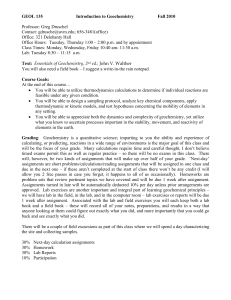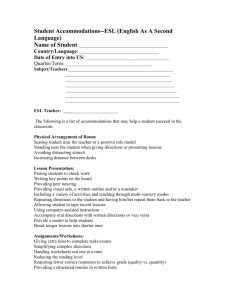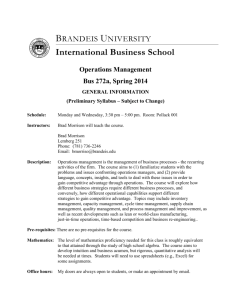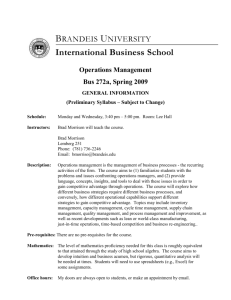MGT 3501 OPERATIONS MANAGEMENT
advertisement
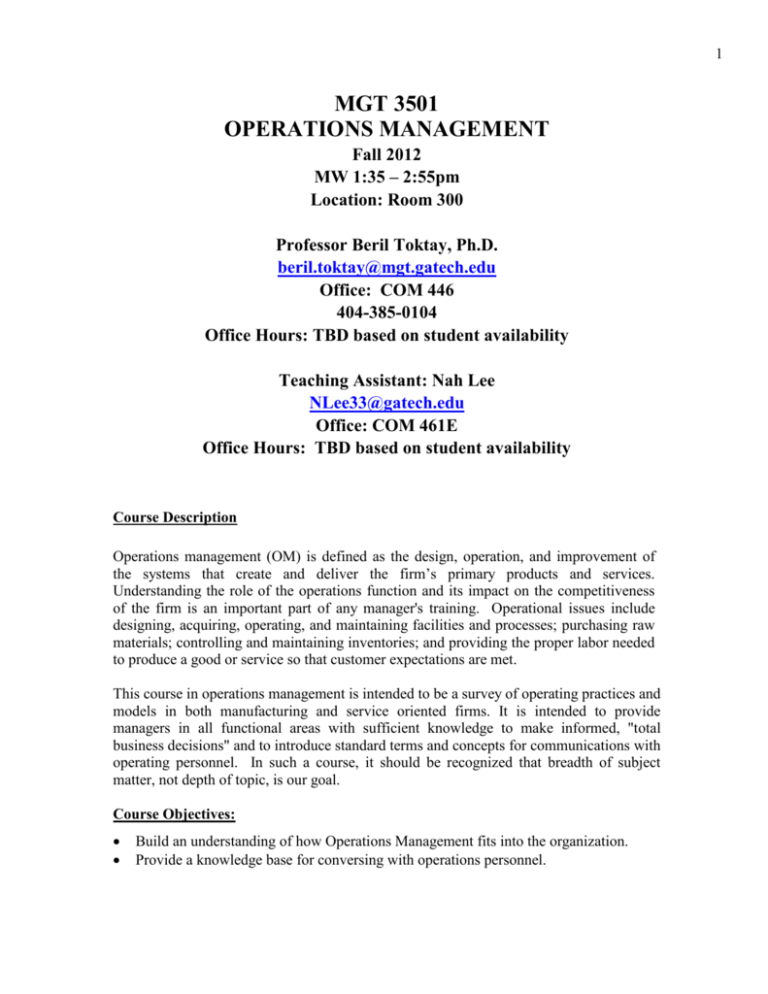
1 MGT 3501 OPERATIONS MANAGEMENT Fall 2012 MW 1:35 – 2:55pm Location: Room 300 Professor Beril Toktay, Ph.D. beril.toktay@mgt.gatech.edu Office: COM 446 404-385-0104 Office Hours: ΤΒD based on student availability Teaching Assistant: Nah Lee NLee33@gatech.edu Office: COM 461E Office Hours: TBD based on student availability Course Description Operations management (OM) is defined as the design, operation, and improvement of the systems that create and deliver the firm’s primary products and services. Understanding the role of the operations function and its impact on the competitiveness of the firm is an important part of any manager's training. Operational issues include designing, acquiring, operating, and maintaining facilities and processes; purchasing raw materials; controlling and maintaining inventories; and providing the proper labor needed to produce a good or service so that customer expectations are met. This course in operations management is intended to be a survey of operating practices and models in both manufacturing and service oriented firms. It is intended to provide managers in all functional areas with sufficient knowledge to make informed, "total business decisions" and to introduce standard terms and concepts for communications with operating personnel. In such a course, it should be recognized that breadth of subject matter, not depth of topic, is our goal. Course Objectives: Build an understanding of how Operations Management fits into the organization. Provide a knowledge base for conversing with operations personnel. 2 Build both quantitative and qualitative analysis skills, especially those needed for managing important business tradeoffs. Provide common sense modeling concepts, which can be used to help managers evaluate various problems that arise in practice. Introduce real-world applications and their connection with Operations Management. Foster “soft skills” – group work, ability to handle unstructured assignments, etc. Course Materials: Required text: Operations Management for Competitive Advantage, 11th Edition, by Chase, Jacobs, and Aquilano, 2005, N.Y.: McGraw-Hill/Irwin. I don’t use the latest edition (which is the 13th) so you have a chance to buy used, but 12th and 13th are good, too. Simulations: You will purchase the Littlefield simulations when the time comes. The cost is $18. Please wait for further instructions. Study.net course pack: You will purchase the course pack online at study.net. Click on http://www.study.net/r_mat.asp?crs_id=30026938 and either sign in or register if you don’t already have an account. This course pack includes the cases and the Benihana simulation access and $32.45 for digital access (which allows you to print the cases yourself). Every student must buy the course pack separately – copying from another student is a copyright violation. Therefore, you will get credit for the Benihana group assignment only if you have bought the course pack. T-square: The following class materials are posted on T Square: class presentations, homework, homework solutions, exam study guides, supplementary articles, videos and practice problems. Prerequisite: MGT 2251 Introduction to Management Science (or MSCI 2400). Grading Policy: Grading for the course will be as follows: Midterms: Final Exam (comprehensive): Mini-case group write-ups (3): Classroom exercises Optional indiv. assignment (pick 1 of 2): 20% each 25% 7.5% each 12.5% If your grade is higher than your lowest group write-up grade, I will substitute your group grade with this assignment grade 3 The assignment for letter grades will be as follows (no curve): A B C D F 90 - 100 points; 80 - 89.99 points; 70 - 79.99 points; 60 - 69.99 points; Below 59.99 points Exams: All exams will have a balanced mix of conceptual and quantitative multiple choice questions. The final exam is comprehensive. You are expected to bring an ID to each exam. Makeup exams will not be given. Students missing a scheduled exam due to an official Georgia Institute of Technology event must prearrange an alternate time to take the Exam. Other excused absences (for health reasons, etc.) must be documented, and the grade missed will be the average of the other exam scores. All other cases will receive a grade of zero for the missed exam. The midterms are noncomprehensive and the final is comprehensive. All exams are closed book, individual efforts. You may bring one two-sided (8 ½ x 11 inches) note and formula sheet to each exam. You need to have your desks clear of all items (cell phone, clothes, books, notebooks, papers, etc.) during the test. I will bring calculators. Mini-Case Assignments There will be three group assignments over the course of the semester. Information about these assignments will be posted later. For fairness, I will not accept late cases no matter what the reason. All submissions will be by e-mail to the TA. She will acknowledge your submission when she receives it, and it is your responsibility to follow up if you don’t get this acknowledgement. Please form groups of three students for these assignments by September 7 and send Nah an e-mail with your names. If you can’t find 3 people, don’t worry, we will assign students to teams where necessary. Your individual grade will depend on an evaluation of your contribution by your team members. Here is how the team evaluation works: Each team member fills an evaluation form after each assignment and distributes 25 points between team members, including him/herself. If two or more team members give you a 0 or 1, you get a 0 on that assignment. If one person gives you a 0, 1 or 2, I investigate and decide accordingly. In all other cases, you get full credit for the assignment. 4 First assignment. Benihana simulation. Instructions for how to log in will be provided later. A 3-page written debrief document (+ appendix) is due Friday, Sep. 21 by 5pm by e-mail to Nah. Second assignment. Littlefield Simulation Part I. For a detailed description of the assignment, please refer to T Square. The simulation will start running Wed, Oct 3th at 5pm and run until Wed, Oct 10th at 5pm. A 2-page written debrief document (+appendix) is due Friday, Oct 12th by 5pm by e-mail to Nah. Third assignment. Littlefield simulation Part II. For a detailed description of the assignment, please refer to T Square. The game will start running Monday, Oct 22nd at 5pm and run until Monday, Oct 29th at 5pm. A 2-page written debrief document (+appendix) is due Thursday, Nov. 1st by 5pm by email to Nah. Optional Individual Assignment: This is to allow you the option to recover from a low case grade. It is an individual and optional case write-up of 3 pages. You can pick either the HP Product Returns case or the Timbuk2 case and submit your writeup to Nah by e-mail before the relevant class session begins. Class Exercises: Short in-class exercises/questions will be collected and evaluated. These can be based on that day’s pre-assigned readings, concepts covered in class that day, or an exercise based on that day’s topic. The goal of class exercises is to help you actively process the class material and maximize in-class learning. They work! (When I started doing these, the exam average increased by a whopping 10 points). The classroom exercise must be turned in as you exit the classroom; I will not accept late assignments for fairness. The grading scale will be acceptable/complete (10), some effort (5) and unacceptable/absent (0). The two class exercises with the lowest scores will be dropped in calculating the class exercise average. If you are there and make a decent effort, you will get full credit. Since they add up to 12.5% of the grade and I drop the two lowest grades, if you miss no more than 2 sessions, you will get 100 for this portion, which will help with your final grade average. If you have absences that are approved on paper by the Institute or the Dean of Students, I will drop the 0 you get for those sessions as well. You can pick up graded exercises from the MGT 3501 TSA box in the Undergraduate Commons (Room 120) in the COM building. I will distribute a release form where you explicitly allow me to do so. If you don’t want to use this system, you can pick your graded assignments from Nah. 5 Homework: To help you understand the material and prepare the exams, homework problems will be assigned and solutions provided. However, homework problems will not be collected or graded. Since some problems in the exams will be closely related to the homework assignments, I highly recommend that you spend time solving them independent of homework solutions, and seeing me or your TA each week with questions you may have. Honor Code: The Honor Code applies to exams and case write-ups. You are responsible for the information contained in the Georgia Institute of Technology Honor Code (available at http://www.honor.gatech.edu/.). I take the Honor Code very seriously. If I suspect a violation, here is the process I will follow, called the Faculty Resolution option, per Georgia Tech guidelines: I will discuss the matter with the student(s) involved. One of three outcomes can occur. 1. Student does not take responsibility, no suspicion remains --> end of story 2. Student does not take responsibility, but suspicion remains --> refer to Dean of Students 3. Student takes responsibility --> Recommend a sanction consisting of change in disciplinary standing (reprimand, warning, probation, suspension or expulsion) and a grade impact and inform Dean of Students. This is called the faculty resolution. In this case, the student will be formally notified of the proposed faculty resolution by e-mail to their Georgia Tech e-mail account. The student may request to have the allegations reviewed by a hearing panel. If the student does not make this request within six (6) working days after the date the e-mail notification of the resolution is sent, the resolution will be implemented and considered notice of a final disciplinary action with no right to appeal. If the student accepts responsibility for a violation and has a prior disciplinary history or the Faculty Resolution recommends suspension or expulsion, the matter will be referred to the Honor Committee (HC) for sanctioning. The HC will seriously consider the Faculty Resolution grade impact recommendations. The student may specifically waive their right to go before a hearing panel and accept an administrative resolution proposed by the Office of Student Integrity. If the student accepts the administrative resolution, the decision goes into effect immediately with no right of appeal. Classroom Etiquette: It is important to have a classroom environment that supports learning for everyone. This requires that some basic rules of respectful behavior be followed. The following are not acceptable: (1) talking among students except when we are working on cooperative class exercises, (2) reading or working on anything except the material in this class, (3) putting your head down on your desk (sleeping), (4) using digital devices (e.g. texting) except when specifically allowed to do so as calculators, or (5) allowing your cell phone to ring during class. Anyone who participates in any of these unacceptable behaviors will be 6 required to leave the classroom -- NO EXCEPTIONS. Laptops are not allowed unless you have a very specific reason and have received permission in advance. I will attempt to learn your name as soon as possible. To help me in this effort, you will need to complete a name tent and place it in front of you for every class. If you misplace your name tent, please make another one. One of the most important things to me about classroom etiquette is to start on time with everybody on board. I would appreciate it if you made an effort to be in your seat in time. To encourage this, I will reward on-time attendance: For every day that at most three people are late, I will pull the cutoff between grades down by 0.05 points. There are 30 sessions this semester. This means that the cutoff between grades could potentially go down by 1.5 points (e.g. to 88.5 from 90 for an A) if everybody is always on time. I will post an on-time attendance tracker on the class page on T Square for you to know where you stand. Note: If your previous class is on the other side of campus, I discourage you from taking this section, but will exempt you from this requirement, provided you tell me as soon as your schedule is finalized. 7 Topics and Sequence: The following is a tentative schedule. In general, even if the specific date of coverage may change slightly, the order of coverage should remain as presented below. Modifications may be made as the semester progresses and the appropriate changes will be announced in class. Week Week starting on Topic Book chap (11th)* 1 August 20 Introduction Operations Strategy 1 2 Other readings/videos** Southwest, Ikea, Walmart & Dell (all in TS) Ideo video (TS/IC) Biosphere rules (CP) The Story of Stuff (TS/IC) 2 August 27 Product Design Product Design 4 4 3 September 3 September 10 5 September 17 5 5 -TN7 TN7 The Benihana case (CP) 4 Labor Day Process Analysis Process Analysis Variability in Processes Waiting Line Management Waiting Line Management 7 Southwest Airlines (CP) 6 September 24 7 October 1 8 October 8 9 October 15 10 October 22 Service Process Design Review Session Midterm 1 on October 1 Forecasting Forecasting Inventory Control October 29 12 November 5 Lean Production Lean Production 12 12 13 November 12 Review Session Midterm 2 on November 12 ERP/MRP/Aggregate Planning Supply Chain Management Supply Chain Management Guest speaker TBD Global Operations 14+16 10 10 15 November 26 16 December 3 Benihana simulation due Friday Pls bring ID 11 November 19 The Variability Game (IC) Waiting to vote/Potty parity (TS) 13 13 15 October Break on Oct 15 Inventory Control Forecasting & inventory mgt applied Quality Management Quality Management 14 Littlefield I starts Littlefield ends, writeup due Friday 15 8+TN8 8+TN8 -- Closed-Loop Supply Chain Mgt Sport Obermeyer (CP) Improvement Act (TS) Final exam 2:50pm – 5:40pm Airline Game (IC) Wood Furniture Study (TS) Dell Video (TS/IC) Pls bring ID ERP at Hillerich & Bradsby (IC) Timbuk2 (CP) HP Product Returns (CP) Comprehensive Littlefield II starts Littlefield II ends, writeup due Thur Review Session December 10 Assignments Pls bring ID * Please see the next page for details **TS = T-square; IC = In-Class; CP = Course pack from study.net Optional ind case write-up due Optional ind case write-up due 8 Course Readings: Below is the material, in addition to the class notes, that you are responsible for. Some of these are sections (red type in 11th edition), and some are subsections (green type in 11th edition). When I assign a section, you need to read all of it. When I assign a subsection, read only that subsection. If you have an older edition, and these titles don't match, let me know and we'll have a look. Chapter 1 - What is Operations Management, Current Issues Chapter 2 - Operations Strategy, Operations Competitive Dimensions, Developing a Manufacturing Strategy, Attacking Through Operations, Productivity Measurement Chapter 4 - The Product Design Process, Designing for the Customer Chapter 5 - All sections Technical Note 7 (Waiting Line Management) - All sections up to but not including Approximating Customer Waiting Time Chapter 7 - Service Process Design The first midterm is up to here. Chapter 13 (Forecasting) - All sections up to but not including Causal Relationship Forecasting Chapter 15 (Inventory Control) - Up but not including Fixed-Time Period Models Chapter 8 (Quality Management) - All sections up to The Shingo System. Optional: Juran's biography Technical Note 8 (Process Capability and Statistical Quality Control) - All sections up to but not including Acceptance Sampling Chapter 12 (Just-in-Time and Lean Systems) - All sections up to but not including North American Modifications of JIT The second midterm is up to here. Chapter 14 (Aggregate Sales and Operations Planning) - Up to but not including Aggregate Planning Applied to Services. Note: I disagree with the way safety stock is handled in this chapter, so always assume it's 0. The example I did in class is from the chapter, but with no safety stock; please refer to the course notes below. Chapter 16 (Material Requirements Planning) - All sections Chapter 10 (Supply Chain Management) - All sections




